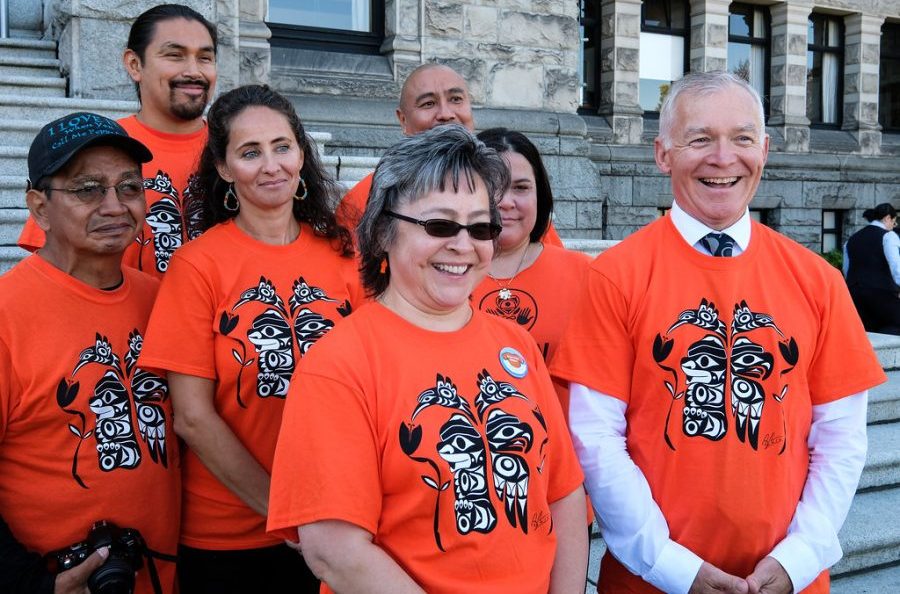Canadians grieving over the death of at least 215 residential school children in Kamloops, B.C. have turned to shoes, teddy bears and orange shirts to honour the dead.
Members of the Tk’emlúps te Secwépemc band confirmed Thursday that they had found the remains of the students — some as young as three years old — after working with a ground radar specialist, Global News reports.
The Kamloops Indian Residential School was one of more than 130 schools operating in Canada between 1831 and 1996, according to The Canadian Encyclopedia. At its peak, there were an estimated 500 students during the ’50s while the school was under the administration of the Roman Catholic Church (Many Christian denominations, including the United Church of Canada, also played a role in running residential schools). It closed when the federal government took over from 1969 to 1978, turning it into a residence for other students at other schools in the Kamloops area.
More on Broadview:
- These First Nations are taking safe drinking water into their own hands
- Young Mi’kmaw activist raised $7,000 for Indigenous lobster fishers
- Clayton Thomas-Müller on the root cause of Indigenous trauma
The union representing B.C. teachers put out the ask for members to wear orange shirts from May 31 to June 4 as a way to commemorate the lives of the unknown students. The coloured shirt has come to represent a way to show solidarity with survivors of Canada’s residential school system and their family members.
View this post on Instagram
Since 2013, Sept. 30 has marked Orange Shirt Day in Canada. The initiative came out of the St. Joseph Mission Residential School Commemoration Project and Reunion events in 2013, which brought together residential school survivors from the Secwepemc, Tsilhqot’in, Southern Dakelh and St’at’imc Nations along with the Cariboo Regional District, the mayors and municipalities, school districts and civic organizations in the Cariboo Region.
Phyllis (Jack) Webstad, a spokesperson for the group and a survivor of the school system herself, shared her story of how her grandmother bought her a new orange shirt for her first day of class. But when she got there, administrators stripped her of her clothes and her orange shirt was never to be seen again.
Elsewhere, other Canadian communities turned to teddy bears and porch lights as a way to mourn. Some parents on Twitter used stuffed animals as a way to talk to their children about what happened kilometres away.
For the 215 children my heart breaks for them and for all survivors of residential schools ?
I’m going to hold my children a little extra tonight and always ?#bearsfor215 ?#everychildmatters ?#reconciliationmatters ?#residentialschool ?#kamloops #kamloopsbc ? pic.twitter.com/li7wRd8e3P— Sez Nalsök, M.Ed.? (@snalsok) May 31, 2021
My grandparents were forced to residential schools. I can’t imagine my 5 year old daughter being forcefully removed from my arms to attend this attempt of assimilation. #215children #215 #215CanadaDayOfMourning #bearsfor215 pic.twitter.com/xGZT6DhOsK
— Darrell Daniels (@darrelldaniels9) May 31, 2021
Candles lit & teddy bears on the porch for the precious children found in a mass grave in bc at a residential school and the many more yet to be found ? #searcheverydamnresidencialschoolproperty pic.twitter.com/gtO6YDmhfP
— Mandabeth (@DrewswifeManda) June 1, 2021
In cities like Regina, Calgary and Toronto, residents have been leaving pairs of shoes to represent the 215 children and draw attention to the issue.
View this post on Instagram
View this post on Instagram
View this post on Instagram
View this post on Instagram
Emotional support or assistance for those who are affected by the residential school system can be found at Indian Residential School Survivors Society toll-free 1 (800) 721-0066 or 24 hr Crisis Line 1 (866) 925-4419.















